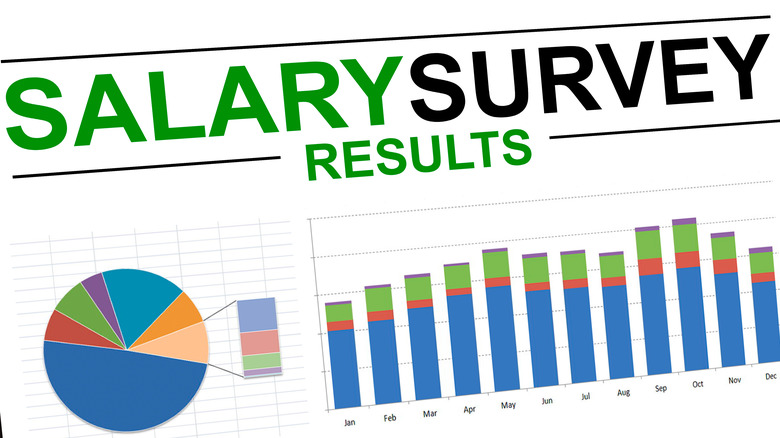How To Talk To Your Boss About Getting A Raise
Are you tired of waiting for performance review time to find out if you'll be getting a raise? It might be a good idea to take matters into your own hands by proactively (and professionally) asking your boss for a pay increase. To successfully request a raise, you'll need to build a business case that clearly communicates to your boss why your pay should be higher than it is.
Preparation is an important key to asking for a raise. You'll need to consider your job and performance carefully, as well as what the going rate is for the type of work you do for your employer. Of course, communication skills are key. The level of professionalism you show when making this request may have a lot to do with how likely your request is to be successful, and it'll also impact the way your boss perceives you as an employee.
Ready to get started? Follow these tips and you'll be on your way to having a productive compensation conversation with your boss.
Make a list of what you have accomplished in your job
When you approach your supervisor to ask for a pay increase, you'll need to be prepared to make a strong case for why your compensation should be higher than it currently is. The best place to begin is by making a list of what you have achieved in your job to share with your boss in support of your request. After all, the idea isn't just to argue that the job itself should pay more across the board (though maybe it should), but to convince your boss that you — not everyone else in the same role, but you — deserve a to make more money based on what you have accomplished, and are continuing to accomplish. Making a list of your major accomplishments to share with your supervisor is a great way to distinguish yourself as someone who has earned the right to be seriously considered for a raise.
Give examples of things you do that are above and beyond
You've probably achieved quite a lot in your job, much of which correlates with what's expected of you based on your job description. That's great, but in order to convince your boss to elevate your pay rate, you should also be prepared to share some examples of what you have done (or are doing) that's above and beyond what you're required to do. After all, achievements and contributions that go beyond basic job requirements certainly deserve special attention (and hopefully money, too).
Demonstrating that you are in the habit of going above and beyond can help you make a case as to why your compensation should be above where it is. So, take stock of any actions you've taken that go above and beyond your job requirements, such as volunteering to serve (or lead) committees, mentoring new employees, cross-training in other departments, or anything else you have done that makes it clear that you're anything but an ordinary employee. Remind your boss so they have top-of-mind awareness of just how valuable you are to the team.
Point out how your actions have positively impacted the company
After being reminded of your accomplishments and how far above the basic requirements you have gone, your boss surely might agree you deserve a raise. However, your supervisor likely isn't the ultimate decision-maker. Chances are that if you convince your boss that you deserve to make more money, they'll have to convince a higher-up to authorize a pay increase. Help make this as easy as possible for your boss by putting your request for a raise in a context that will capture the attention of managers at the highest level of the organization.
That's the bottom line, of course. Take your list of accomplishments a step further and provide examples of how what you have achieved in your position has had a positive impact on overall business results. Did you contribute a cost-saving idea that led to a higher profit margin? Did you refer new customers who wouldn't otherwise have purchased from your employer? Spell out the dollars and cents impact you have had on the company and you just might find that your paycheck grows a bit as a result.
Share facts about what similar jobs pay at other companies
Business managers make decisions based on facts and data. It's great to point out all of the things that make you a great employee, but you'll also need to make a case as to why your current compensation may not be sufficient for an employee with your duties and job performance. To this end, you should do your research before you go to your supervisor and request higher pay. By taking the time to get a good idea of how much jobs similar to yours are paying with other companies, you'll be able to provide your boss with objective information that supports your request for a raise.
There are several online resources you can use to get salary trends, including the Bureau of Labor Statistics and Salary.com. It's also a good idea to identify other employers in your area that your company competes with for talent and try to find out what they typically pay. See if they have any jobs advertised that include a pay range, or look on Glassdoor for information about what they pay.
Compare what you're making to current starting pay for the job
Does your pay reflect your years of experience or tenure with the company, or is your pay not much higher than what brand-new, inexperienced employees doing the same job are being paid? Many companies have increased starting pay to be able to recruit new hires, but often don't adjust pay for current workers proportionally. This results in pay compression, which is a situation in which brand new employees (even without experience) make close to what experienced employees in the same jobs are earning. Sometimes starting pay even exceeds what current workers are earning, resulting in wage inversion.
If starting pay was lower when you first began working with the company, the amount that you're making now might not be all that much more than what the company would offer to a brand new employee, with the same level of experience you had when you started. That's important information to have when you ask for a raise. Look at your company's current job advertisements to see what starting pay is listed, then compare that number to what you're making.
Ask for a specific percentage or dollar amount
When you request a raise, it's a good idea to ask for a specific amount or percentage. After all, a "raise" could technically be five cents per hour more than you are making now. While any increase is a step in the right direction, chances are that you're hoping to get a good bit more than that. Your boss won't know what kind of raise you feel you deserve if you don't specifically tell them. Use the information that you gather when researching what other companies pay for similar jobs to help you come up with a specific amount to ask for.
If your company's pay is significantly lower than you could learn elsewhere for similar work in the same geographic area, you may be able to support asking for an increase that would bring your pay to a competitive level. The same is true if your company is paying new hires close to what you are earning. However, if what you are already making is in line with the going rate, you'll need to consider that when asking for more money. In this case, your argument shouldn't be that the position is underpaid, but that your performance warrants being bumped up to a higher point within the pay scale. Ask for a little more than you truly expect so there's room for negotiation, but don't ask for an unrealistically inflated amount.
Find the perfect time to ask for a pay increase
Timing is a very important consideration when asking for a pay increase. Don't go to your boss's office and ask for a raise shortly after you have made an error that is going to cost the company money, when your boss is extra-stressed, or when the company is experiencing reduced earnings. Further, if you get irritated when you look at your next pay stub, don't march over to your boss's office and demand more money. Those are all examples of bad times to ask for a raise. We can almost guarantee that your request won't be successful if you request a pay increase in any of these situations.
Instead, you need to choose a good time to ask. Wait until things are going well with the company and you've gone a long stretch with only positive results. When that happens, pay attention to your boss's schedule and mood then carefully make your move when conditions are favorable. You'll have a much higher chance of success if you ask when the time is right for your boss, for the company, and for you.
Schedule a meeting to discuss your request in person
When the time is right to ask for a raise and you've gotten up the nerve, the next step is to schedule a face-to-face meeting with your boss to present your request. Face-to-face communication is appropriate for the seriousness of the topic. You shouldn't ask for a raise over the phone or via email, text, or Slack. This kind of request should be done in person, in a private discussion between just you and your supervisor.
Meeting 1:1 with your boss makes it possible for both of you to be fully engaged in the discussion and to speak frankly and honestly. If you work on-site or via a hybrid arrangement, ask to meet with your boss in person, via a private meeting in their office or a conference room. If you work remotely, request a meeting via the teleconferencing platform that your company uses for face-to-face meetings.
Be ready to answer questions your boss might ask
When you meet with your boss, they are going to have some questions for you. It's up to you to be prepared to answer their questions. Before you go into the meeting, think through what they might ask and get ready to respond effectively. Try to put yourself in your boss's position and ask yourself what you would ask an employee who is asking for more money. Beyond that, if you have any friends or relatives who work in management, speak to them. Ask what questions they would pose in this type of situation, as they may have ideas that you wouldn't come up with on your own. Once you have a good list of potential questions, decide how you'll respond to each one. Put your responses down on paper, then practice out loud. Your goal should be to provide clear answers that answer your boss's question and that help you persuade your boss to see things your way in terms of your request for a pay increase.
Practice what you are going to say ahead of time
Thinking about what you want to say ahead of time is important, but it's also very beneficial to practice out loud before are in front of your boss. Start by practicing your responses out loud on your own, so that you can coherently and confidently verbalize what you want to say. Record yourself practicing so you can replay your responses to identify what you have just right and identify areas that may need to be reworked or fine-tuned.
Once you get comfortable with how you are going to word your statements, ask a friend to help you rehearse. Explain what you're doing and ask them to play the part of your boss in a mock pay raise meeting. You may want to give them a few sample questions to ask you ahead of time, but also let them come up with questions of their own. This will give you experience coming up with responses in real-time, which you'll need to be ready to do when you meet with your boss. Ask for their feedback and apply it to your further preparation.
Communicate respectfully, no matter how the discussion goes
Unless you're planning to quit your job if you don't get a pay raise, your boss will still be your boss after meeting with you to discuss your compensation. Don't lose sight of that fact, even if it seems like the meeting is going to lead to the outcome that you want. It's always important to communicate respectfully and effectively with your boss.
If it seems like your boss doesn't agree that you should be considered for a raise, don't lose your temper, become angry, or hurl accusations at them. No good will come from that. Behaving badly will certainly not present you as an employee who should be considered for higher pay. Instead, be intentional in your communication, focus on conveying your points in a way that will reinforce or strengthen a positive employee/employer relationship, and listen to what your boss has to say. You may have to agree to disagree, and that's okay.
Thank the boss for discussing, no matter what the outcome
Whether the meeting goes the way you want or not, be sure to sincerely thank your boss for speaking with you at the end of the discussion. If they are able to actually approve a pay raise in the meeting, you'll surely remember to say thank you for that. However, chances are that they won't be able to make an on-the-spot approval even if they strongly support your request. And, there is always the chance that they cannot support your request for more money for a variety of reasons, the company's compensation policies, its financial position, or factors related to your performance or behavior.
Even if you're leaving the meeting without getting what you want doesn't mean that you shouldn't say thank you. You absolutely should. After all, your boss took the time to hear you out and to consider your request. Plus, the fact that today's answer isn't yes doesn't mean that it won't become a yes at some point. The discussion you have for your boss this time may lay the foundation for a future pay increase, or even a future promotion. The way you communicate — which includes expressing appreciation — may certainly have an impact on that.
If the answer is no, ask what you can do to work towards a raise
It can be hard to take no for an answer, especially when you've worked so hard to prepare and build a solid argument in support of your request for a raise. However, you can learn from the know and show your boss that you are truly committed to moving forward by using the no as a learning opportunity.
Rather than just thinking, "Oh well, I tried," or arguing with your boss about a decision that may be well beyond their control, ask your boss for suggestions of what you can do to be considered for a raise in the future. They may be able to provide you with ideas of how you can distinguish yourself in your job or ways you can contribute to the organization on a broader level that will get the attention of the executive team.
Ask for alternatives that will add value to your compensation
Getting a pay raise isn't the only way to add value to your compensation. Your first priority may be a higher paycheck, but if that's not possible, it's a good idea to ask your boss to consider alternatives that add value to your compensation. For example:
- If you have been thinking about going back to school to study something that relates to your current job or industry, ask your boss if the company would consider covering the cost of tuition.
- If your boss says you need to show more initiative, ask them to approve paying for you to join a professional association or to cover the cost of registration and/or travel to conferences or other professional development events.
- Consider asking to be among the first to be considered for overtime or on-call duty, as this can both help increase your pay and demonstrate your commitment to the team.
These are just a few ideas to help you get started. You may even want to ask your boss for suggestions of other ways that you can increase your earning potential with the company. They may have some great ideas or opportunities to share.
Follow up the meeting with a detailed email
After meeting with your boss, send them a thoughtful, well-written follow-up email to document the discussion. Start by thanking them for taking the time to speak with you and specify the date that the two of you met for this discussion. Beyond that, provide a brief overview of what the two of you discussed during the discussion. Make sure the tone is professional and objective — think of it as a "just the facts" email.
If either of you agreed to take future actions as a result of the meeting, be sure to state that in the email. For example, if your boss tells you that they will find out when the company expects to be able to consider pay increases and let you know, note that in the email. If your boss says that you need to show more initiative to be considered for a raise, note that in the email along with what specific action steps the two of you discussed for you to implement.
Save a copy of the email, both so you have documentation of the discussion and because the information in it may help you prepare for future discussions in which you request a pay increase or ask to be considered for a promotion to a higher-paying job.















